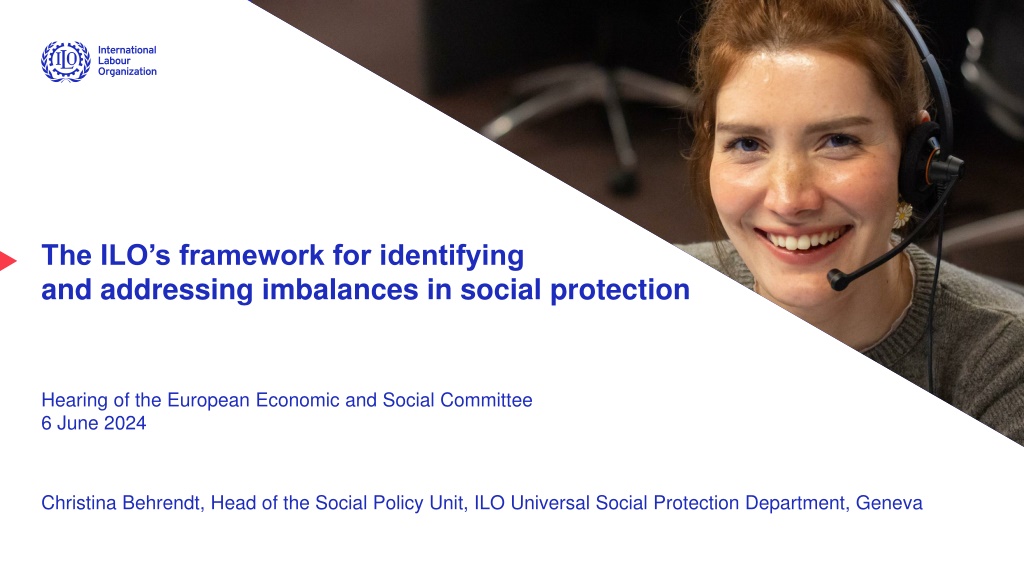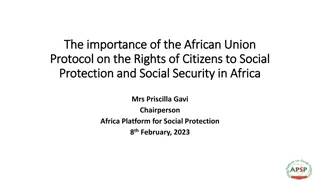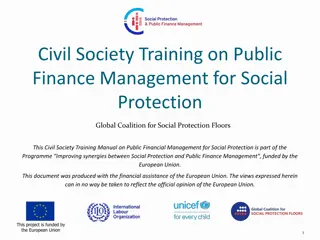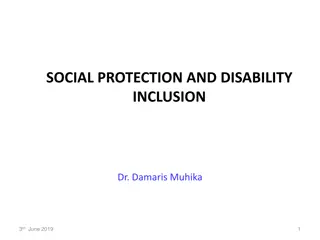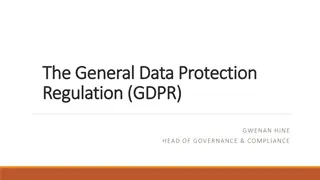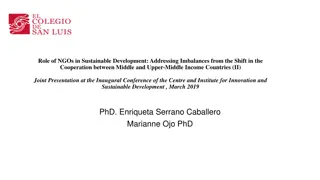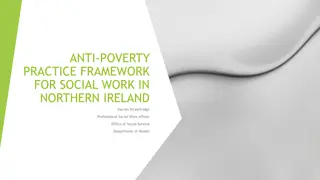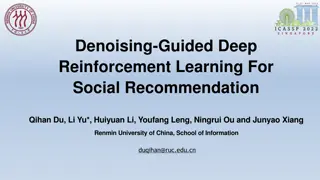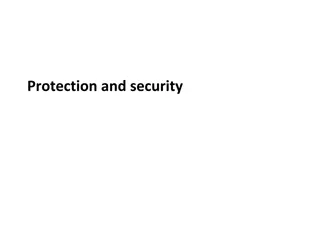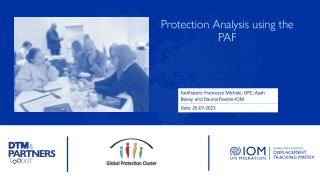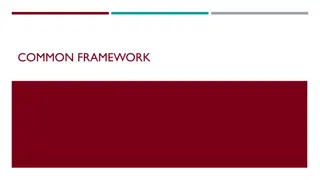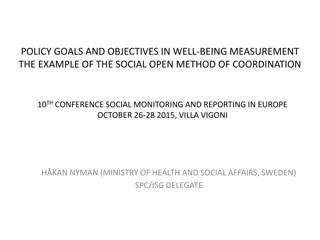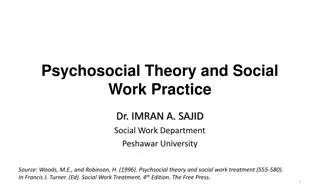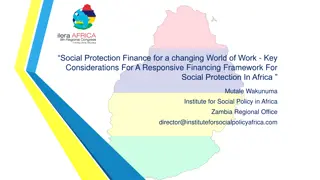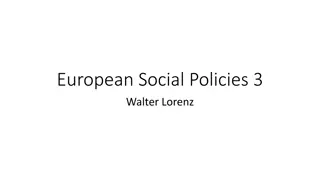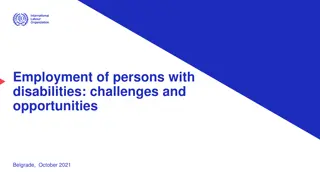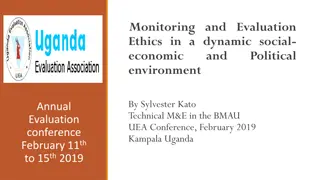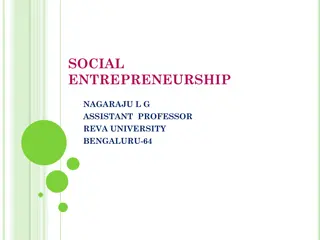The ILO's Framework for Social Protection Imbalances
The International Labour Organization (ILO) addresses imbalances in social protection through its framework, focusing on various types of employment relationships and coverage challenges. It emphasizes the need for urgent action to close coverage gaps, improve enforcement, adapt contribution procedures, and ensure adequacy in social security. The approach considers standard, atypical, and non-standard employment, highlighting issues such as casual employment, part-time work, and dependent contractors. Advancing social justice and promoting decent work are key objectives.
Download Presentation

Please find below an Image/Link to download the presentation.
The content on the website is provided AS IS for your information and personal use only. It may not be sold, licensed, or shared on other websites without obtaining consent from the author. Download presentation by click this link. If you encounter any issues during the download, it is possible that the publisher has removed the file from their server.
E N D
Presentation Transcript
The ILOs framework for identifying and addressing imbalances in social protection Hearing of the European Economic and Social Committee 6 June 2024 Christina Behrendt, Head of the Social Policy Unit, ILO Universal Social Protection Department, Geneva
ILO framework and approach International Labour Organization: tripartite, based on social dialogue; specialized agency of the United Nations >> decent work and social justice Internationally agreed normative framework: international social security standards, including Social Security (Minimum Standards) Convention, 1952 (No. 102) Social Protection Floors Recommendation, 2012 (No. 2012) Recent resolutions and conclusions of the International Labour Conference Centenary Declaration for the Future of Work, 2019 Global call to action for a human-centred recovery from the COVID-19 crisis, 2021 Resolution and conclusions on social protection (social security), 2021 Flagship report: World Social Protection Report 2020-22 (next edition to be published in September 2024) Advancing social justice, promoting decent work
3 Depends on minimum thresholds with regard to length of employment Critical: casual employment Temporary employment DEPENDENT EMPLOYMENT Social security coverage of workers in non-standard and atypical employment NON-STANDARD Depends on minimum thresholds with regard to regular working time Critical: marginal part-time work, zero-hour contracts Part-time employment In most European countries the majority of workers are covered, but there are challenges: Legal coverage, enforcement and compliance (especially for self-employed workers) Eligibility rules and adequacy Contribution and registration procedures not fully adapted to specific situation of workers Yet, social security coverage is particular important for workers in these forms of employment Needs urgent action to close coverage and adequacy gaps Depends on regulation with regard to responsibility of each party Critical: casual employment, marginal part-time work Multi-party employment relationships Dependent contractors/ disguised employment Depends on mechanisms to ensure correct classification of employment relationships; in some countries specific rules for dependent contractors Critical: inadequate regulation and enforcement INDEPENDENT EMPLOYMENT Depends on modalities for legal coverage by sector and type of profession Genuine self-employment Critical: lack of coverage or voluntary coverage; adapted mechanisms to take into account contributory capacities; complex administrative procedures; fragmentation of the system Advancing social justice, promoting decent work
Moving towards universal social protection: Key policy orientations of the International Labour Conference Reinforcing social protection systems so that they can adequately respond to change and enable people to better navigate work and life transitions, including in the context of just transitions towards environmentally sustainable societies and economies. Universal social protection: ensuring adequate social protection for all, including a solid social protection floor, through a combination of contributory schemes (usually social insurance), inclusive of part-time, temporary and self-employed workers tax-financed benefits, including categorical benefits with broad coverage and social assistance Ensuring social protection for workers in all types of employment and securing legal certainty for workers and employers, ensuring the correct classification of employment relationships, preventing the informalization of employment and facilitating transitions from the informal to the formal economy. Global call to action for a human-centred recovery from the COVID-19 crisis (link) Resolution and conclusions on social protection (social security (link) human-centred recovery from the COVID-19 crisis [link] Gender-responsive social protection policies, addressing gender gaps in coverage and adequacy of social protection. Investing in the care economy to facilitate access to affordable and quality childcare and long-term care services as an integral part of social protection systems, supporting employment of workers with care-giving responsibilities and an equal sharing of care work between women and men. Global call to action for a Ensuring the adequacy and sustainability of national social protection systems building on effective social dialogue, based on the principles of solidarity, collective financing, well-balanced intergenerational fairness, the achievement of gender equality. Resolution and conclusions on social protection (social security) [link] Broader policy context: policies to protect all workers, promote inclusive economic growth and employment, based on social dialogue, for decent work and social justice. Advancing social justice, promoting decent work
Building universal social protection systems for the future of work: Key take-aways for a transformative approach Effective regulation of labour markets and employment, including the correct classification of employment relationships -> indispensable for ensuring legal certainty for employers and workers, a level playing field for economic activitiy and preventing a race to the bottom Universal social protection systems, with strong and inclusive social insurance and tax-financed mechanisms, to ensure universal access to adequate and sustainable social protection, adapted to changing needs and labour market mobility flexibility requires social security Employment policy and regulation Universal social protection Other policies to support life and work transitions, such as lifelong learning, health and care services, gender equality, employment services and active labour market policies including enterpreneurship training, just transition to environmentally sustainable societies and economies. Social dialogue Effective social dialogue based on effective and inclusive representation and including collective bargaining Policies for life and work transitions Conducive policy environment, including macro-economic policies, trade and competition policies and tax policies.
Building gender-responsive universal social protection systems, including floors World Social Protection Report 2020-22: Social protection at the crossroads in pursuit of a better future Building the Future of Social Protection for a Human-Centred World of Work Covering workers in all types of employment The role of digital labour platforms in transforming the world of work Policy resource package on extending social security to workers in the informal economy Extending social security to self-employed workers: lessons from international experience Making the Right to Social Security a Reality for Domestic Workers: A Global Review of Policy Trends, Statistics and Extension Strategies Social protection systems and the future of work: Ensuring social security for digital platform workers Extending social security to workers in the platform economy Extending social protection to the cultural and creative sector COVID-19 crisis response: ILO portal on social protection responses to COVID-19 ILO portal on COVID-19 and the world of work Useful resources Other key resources: ILO Social Protection Platform Toolkit on ILO social security standards Joint UN Social Protection and Human Rights web platform Global Partnership for Universal Social Protection (USP2030) Contact: behrendt@ilo.org
